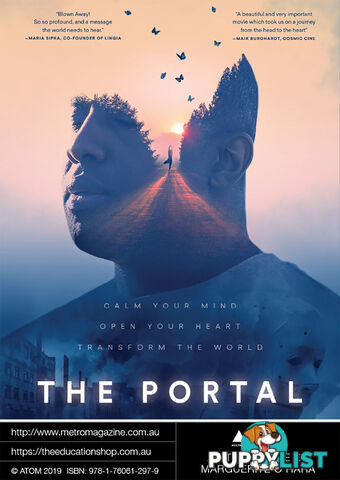This ad is on hold, please check again later.
Portal, The ( Study Guide)
$7.50

DESCRIPTION
At a time of daily earth-shattering revelations, The Portal addresses the question of 'What can I do to help?' The answer is simple: meditate. The Portal is an immersive, cinematic experience of transformation on a personal scale, with global implications, that follows six people who transform their own lives, providing inspiration and a toolkit for change. There is also a robot programmed to respond sympathetically to people. The film is richly visual and sonically powerful, breaking ground with its use of binaural beats* in an already evocative score as it takes the viewers on their own mindfulness journey. The filmmakers invite viewers to enter the portal to find out more. The Portal is written and produced by Tom Cronin and Jacqui Fifer. Tom Cronin is the founder of The Stillness Project, a global movement to inspire 1 billion people to sit in stillness daily. The film features six individuals who have each faced different crises in their lives that led them to make life changes that resulted in them transforming their priorities and how they live. There are also contributions from a number of academics and futurists who have a strong commitment to changing how we might realign our values and live more satisfying lives. *Binaural beats: when the right and left ears listen to two slightly different frequency tones. Curriculum Links The Portal would be best suited to middle and senior secondary students studying subjects within the Humanities and Social Science areas of the National Curriculum. It would also be valuable for tertiary students studying psychology, health sciences, social work and counselling. The humanities and social sciences are the study of human behaviour and interaction in social, cultural, environmental, economic and political contexts. The humanities and social sciences have a historical and contemporary focus, from personal to global contexts, and consider challenges for the future. In the Australian Curriculum, the Humanities and Social Sciences learning area also includes a study of history, geography, civics and citizenship and economics and business. Through studying Humanities and Social Sciences, students will develop the ability to question, think critically, solve problems, communicate effectively, make decisions and adapt to change. Thinking about and responding to issues require an understanding of the key historical, geographical, political, economic and societal factors involved, and how these different factors interrelate. The Humanities and Social Science subjects in the Australian Curriculum provide a broad understanding of the world in which we live, and how people can participate as active and informed citizens with high-level skills needed for the 21st century. The general capabilities in this area of the curriculum include: Personal and Social Capability. The organising elements for Personal and Social Capability are:- Self-management
- Self-awareness
- Social management
- Social awareness
- Some of the appropriate subject areas include Personal Development, Psychology, Ethics and Society and Civics and Citizenship. Much of the information about meditation and mindfulness explored through the life stories in the film would also be of interest to students studying Philosophy, Psychology, Ethics and Society and Comparative Religions.
ADDITIONAL INFORMATION
- Price
- $7.50
- Condition
- New
- Delivers To
- Australia Wide








